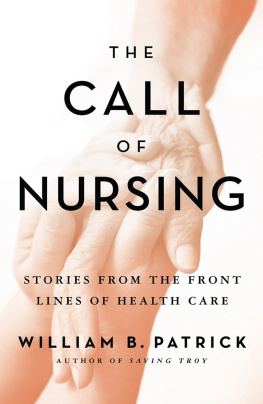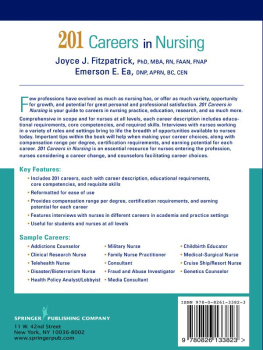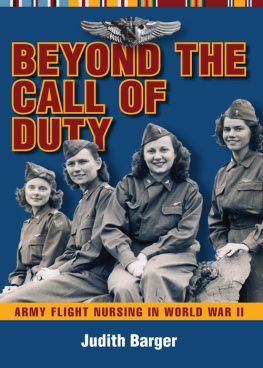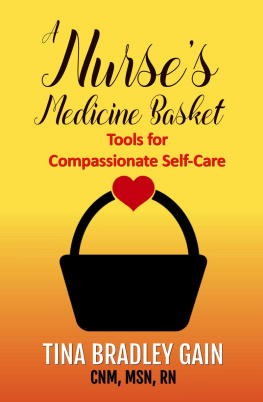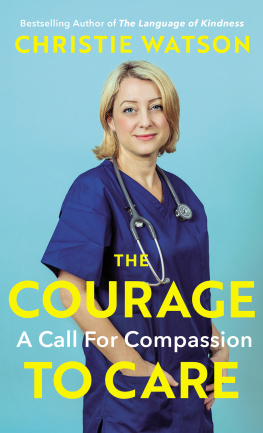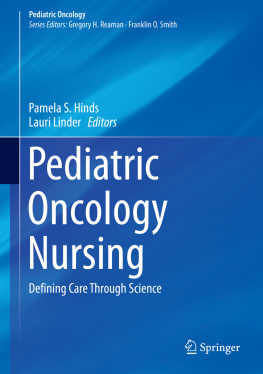All rights reserved. No part of this publication may be reproduced, stored in a retrieval system, or transmitted, in any form or by any means, electronic, mechanical, photocopying, recording, or otherwise, without the written prior permission of the author.
All material has been used with the permission of the participants.
Cover design by Philip E. Pascuzzo.
Some suffer so much, I recall the experience sweet and sad....
FOREWORD
O ccupational stories can serve as powerful tools: they can educate us about the details of a specific job, illustrate various realities within that career, and enrich our emotional and spiritual lives, all at the same time. The compelling narratives in The Call of Nursing: Stories from the Front Lines of Health Care certainly fulfill all those expectations. while treating us like trusted confidantes, these nurses allow us to peek behind the curtain of a profession that deals with individuals at their most vulnerable times when they are patients.
These twenty-three, first-person profiles in nursing are ethnically, culturally, and educationally diverse. Some of the women and men here emulated mothers who were nurses, and were sure of their life paths before they entered high school. Some switched careers in midstream, for better salaries or increased job security, among other things. And others came to nursing much later in life, often answering a mysterious call to follow a vocation that could make a difference for individuals in need. But, taken together, their stories chronicle work experiences and environments that not only illuminate the broad range of career options for nurses but also form a valuable body of health care knowledge. All in all, this book communicates the essence of nursing.
The profound qualities that unite the voices we hear in this book are passion for the profession and compassion for patients. whether you read this book from cover to cover or savor these nurses lives one at a time, you cant help but be moved by their hopes, their struggles, and their joys. If you are a nurse, youll recognize yourself somewhere in here. If youre lucky enough to have a nurse as a friend or family member, you will probably rush through reading it so you can share these stories with them. And if you arent a nurse yet, I guarantee this book will make you consider becoming one.
Gertrude B. Hutchinson, MSIS, MA, RN, CCRN-R
Archivist, Bellevue Alumnae Center for Nursing History
DR. COLLEEN WALSH
I have worked as a nurse on orthopedic units at Level I trauma centers in Boston, in Albany, New York, in Charlottesville, Virginia, and in Ann Arbor, Michigan, among other places, for over thirty years. I have also completed four nursing degrees while I was working full time and raising a family. In 2011, I earned my doctorate of nursing practice from the University of Southern Indiana, in Evansville, where I am currently an assistant professor of nursing.
I always knew I was going to be a nurse. There was never a time during my early schooling, elementary through high school, when I didnt want to be one. There were absolutely no medical people in my family, so I dont know where my inspiration came from. It was just something I innately felt I wanted to do, and I never wavered from that course. I guess I was born that way.
However, I was also born with knock knees. Knock knees are when your knees rub together but your feet point out. Its the opposite of bowlegged. To make it worse, I was your typical chubby kid, and weight exacerbates that problem. My kneecaps would dislocate and at times it was very painful to walk. I had my first cast on when I was seven, and I went through my first major procedure in 1963, when I was only eleven. Over the course of my lifetime, I have undergone seven more surgical procedures to correct the problem. So I possessed a natural affinity for orthopedics because I knew what it was like to be on the other side of the cast.
When I was sixteen, after my second major procedure, a Nurse Ratched type took care of me. She made me cry every single day I was in the hospital. Now that I look back on it, though, she was probably doing what she was supposed to do. But it was the manner in which she did it. She was mean. She made fun of me and called me a baby. Even with that, I still wanted to join the profession, and I swore I would do everything I could to become the antithesis of that nurse.
On my first orthopedic rotation during nursing school, I immediately empathized with the patients. I understood the sheer magnitude of being stuck in that bed. I had experienced some of the mechanics of orthopedics, in terms of traction and weights and how they kept bones in place, and that certainly helped. I definitely knew what it felt like having little plaster crumbs under my butt, and getting a rash that drove me crazy, and how much it meant to have clean sheets. Those small things might sound unimportant, but theyre magnified into an incessant form of daily torture when youre a patient.
There werent too many of us who specialized in orthopedics when I started working. As an orthopedic nurse, I was dedicated to alleviating pain and restoring function due to musculoskeletal injuries or disorders anything related to a bone or a joint. I have taken care of the full spectrum, from someone with a simple broken finger to someone who was completely paralyzed and on a ventilator for five years. I also treated many people, whom we called multiple-trauma patients, who suffered a combination of fractures, chest injuries, and internal injuries. Usually the other injuries healed faster than the orthopedic ones. After they passed the crisis phase in the ICU, they would come to us. I had patients who rode motorcycles and hit guardrails and left part of their shinbones behind. Their shinbones hit so hard that they just splintered into pieces and we would have to rebuild them. That was a common injury.
Orthopedic practice is very different now. We have procedures and materials we didnt have back then. We can insert artificial bone, or move bone from another part of the patients body to fill a defect. But back in the seventies and eighties, patients with severe orthopedic injuries stayed in the hospital for months. Then, more often than not, we would see them back many times over the course of several years because of complications from the original injury. In the early days, I got to know my patients pretty well.
Now we have new orthopedic pins and rods that can actually immobilize a fracture so well that patients dont have to stay in a hospital for three or four months. They can go home in three or four days. The titanium rods we put in essentially do the job of the bone until it can heal naturally. Biologically, titanium is an inert compound, so it doesnt cause allergic reactions and isnt perceived by the body as a transplant. But normally these things are ultra-sterile. Unless theres an infection present, patients tolerate them very well. If the titanium doesnt bother a patient, we just leave it in there.

